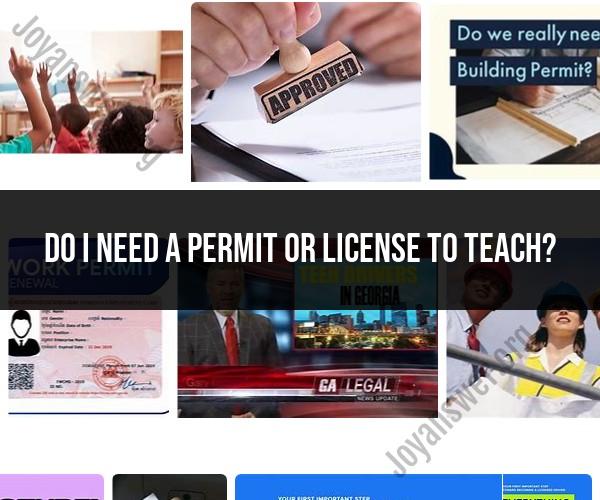Do I need a permit or license to teach?
Whether or not you need a permit or license to teach depends on various factors, including the location, level of education, and the subject matter you intend to teach. Here are some general guidelines:
Public School Teaching:
- In most countries, teaching in public primary and secondary schools typically requires a teaching license or certification. These licenses often involve completing a teacher education program and passing required exams. Regulations vary by state or country.
Private School Teaching:
- Teaching in private schools may or may not require a teaching license, depending on local laws and school policies. Some private schools hire teachers without formal teaching credentials, particularly for specialized subjects.
Higher Education and College Teaching:
- Teaching at the college or university level often requires at least a master's degree or higher in the relevant field. Teaching qualifications and licensing requirements may vary by institution.
Teaching in Non-Traditional Settings:
- In some cases, you can teach in non-traditional settings, such as tutoring centers, adult education programs, or as an online educator, without a formal teaching license. Qualifications and requirements can differ based on the specific organization or program.
Homeschooling:
- Homeschooling regulations vary by country and state. Some locations require parents or guardians to meet certain educational or teaching qualifications, while others have minimal requirements. Be sure to research the homeschooling laws in your area.
Vocational and Technical Education:
- Teaching vocational or technical subjects might have different requirements, often focusing on industry experience and expertise rather than traditional teaching credentials.
Subject Matter and Specialty:
- The specific subject or area you intend to teach can influence the licensing requirements. For instance, teaching mathematics might have different qualifications compared to teaching music or arts.
Continuing Education and Professional Development:
- Some locations or institutions may allow individuals to teach on a provisional basis or while working toward formal credentials. Professional development or in-service training may be necessary in such cases.
Foreign Credential Evaluation:
- If you have teaching credentials from another country and wish to teach in a different jurisdiction, you may need to have your qualifications evaluated and potentially take additional steps to meet local requirements.
It's crucial to research the specific legal requirements for teaching in your region or for the educational setting in which you plan to teach. This may involve consulting your local department of education, school districts, or educational institutions.
Keep in mind that teaching without the required permits or licenses, where necessary, can lead to legal consequences. It's essential to ensure you meet the relevant qualifications and comply with local laws and regulations to avoid potential issues. If you're unsure about the requirements, it's a good idea to seek guidance from the relevant education authorities or legal professionals.
Licensing and Permit Requirements for Teachers
Teaching is a licensed profession in all 50 states and the District of Columbia. This means that teachers must meet certain requirements, such as completing a teacher preparation program and passing a state-approved teacher certification exam, in order to teach in a public school.
The specific licensing and permit requirements for teachers vary from state to state. However, all states require teachers to have at least a bachelor's degree and to complete a teacher preparation program. Teacher preparation programs typically include coursework on education theory, classroom management, and subject matter knowledge.
In addition to completing a teacher preparation program, teachers must also pass a state-approved teacher certification exam. The teacher certification exam assesses a teacher's knowledge of education theory, classroom management, and subject matter knowledge.
Once a teacher has met all of the state's requirements, they will be issued a teaching license. Teaching licenses are typically valid for a certain period of time, such as five or ten years. Teachers must renew their teaching licenses by completing continuing education courses.
Obtaining Teaching Licenses in Different States and Countries
If you are interested in teaching in a different state or country, you will need to research the licensing and permit requirements in that state or country. Many states have reciprocity agreements, which means that teachers who are licensed in one state may be able to obtain a license in another state without having to meet all of the requirements from scratch.
However, some states and countries do not have reciprocity agreements. In these cases, teachers may need to complete additional coursework or pass additional exams in order to obtain a teaching license.
Alternative Pathways to Becoming a Licensed Teacher
There are a number of alternative pathways to becoming a licensed teacher. For example, some states offer teacher residency programs, which allow teachers to earn their teaching license while working in a public school classroom. Other states offer emergency teaching permits, which allow teachers to teach without a full teaching license for a limited period of time.
Alternative pathways to becoming a licensed teacher can be a good option for people who have a bachelor's degree and want to become a teacher without having to complete a traditional teacher preparation program.
Continuing Education and Professional Development for Educators
Teachers are required to complete continuing education courses in order to renew their teaching licenses. Continuing education courses help teachers to stay up-to-date on the latest trends in education and to improve their teaching skills.
There are a number of different ways for teachers to complete continuing education courses. Teachers can take online courses, attend workshops, or participate in professional development programs offered by their school district or state education agency.
Support and Resources for Aspiring Teachers
There are a number of support and resources available to aspiring teachers. For example, the National Education Association (NEA) and the American Federation of Teachers (AFT) offer a variety of resources for aspiring teachers, such as career guides, job boards, and professional development opportunities.
Aspiring teachers can also find support from their local school district or state education agency. Many school districts and state education agencies offer programs and resources to help aspiring teachers prepare for a career in education.
If you are interested in becoming a teacher, I encourage you to research the licensing and permit requirements in your state and to explore the different support and resources that are available to aspiring teachers.













